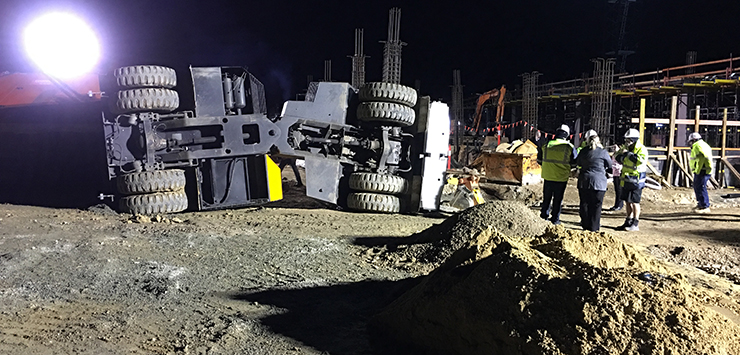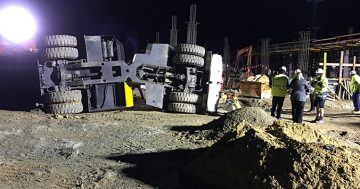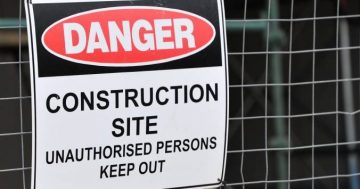
The University of Canberra Hospital worksite on the night of 4 August 2016 after a crane toppled, killing Herman Holtz, 62. Photo: ACT Police.
A major corporation has been found “entirely responsible” for failing to ensure an important safety assessment had been conducted before a crane tipped over on its worksite, killing an employee.
The company, Multiplex Constructions, was fined 10 per cent of the total possible penalty – $150,000 – by Chief Magistrate Lorraine Walker on Friday (12 November).
Herman Holtz, 62, died when a crane tipped while carrying a generator and landed on him at the University of Canberra Hospital construction site in Bruce on 4 August 2016.
Multiplex was the head contractor.
According to the facts of the case against Multiplex, a 10.3-tonne diesel-powered electrical generator had to be moved around the worksite to power a tower crane. On the afternoon of 4 August 2019, the company contacted RAR Cranes requesting a crane for the job.
A site inspector working for RAR Cranes, who initially recommended a much larger crane, contacted his office and arranged for a 25-tonne crane to come to the site after discussions with Multiplex employees.
When Watts arrived with the crane, he did not do a site-specific risk assessment of the lift, including checking the slope of the path he was going to take, which would have shown that the degree of the slope exceeded the crane’s abilities. There were other issues, such as how the proposed lift was outside the safe lifting capacity of the crane.
A counterweight was also fitted in the wrong direction resulting in weight monitoring inaccuracies.
Magistrate Walker said no Multiplex representative required the site-specific risk assessment be completed before the fateful lift. By failing to sign off on the document, Multiplex removed a level of protection at the site and a possible consequence of its actions was that the crane could be operated unsafely, she said. The crane was ultimately used unsafely before Mr Holtz was killed.
Magistrate Walker said “avoidance of the breach was not difficult” as Multiplex controlled the worksite.
But she said the corporation’s guilty plea related to the risk it created, not the consequence of Mr Holtz’ death.
She noted while Multiplex was “entirely responsible” for its part in failing to ensure the document was complied with, it had otherwise been a “good corporate citizen”, had been proactive in analysing the use of the crane and had provided support to Mr Holtz’s family.
“I conclude this offence is far from the worst case, but neither is it a trivial breach,” she said.
Multiplex pleaded guilty to failing to comply with a health and safety duty that exposed a person to the risk of death or serious injury and faced a maximum fine of $1.5 million.
It was convicted and fined $150,000.
Multiplex executive director of operations Don Aroney said Mr Holtz was a much-loved employee and his death was felt deeply across the business.
“We have acknowledged our part in the terrible event and sincerely apologise for those failings,” he said.
“We extend our sympathies to Herman’s family and remain committed to doing whatever we can to ensure a tragedy like this is not repeated.”















